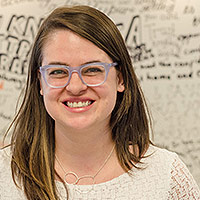Wattpad: an online universe of readers and writers. Interview with Allen Lau and Ashleigh Gardner
With over 20 million writers and readers throughout the world, Wattpad has become a platform to be reckoned with. Both established and new authors can write on Wattpad, while publishers use the site to promote their titles, share exclusive content, serialize books online and even host contests to engage writers. On this occasion we spoke to Allen Lau (co-founder/CEO) and Ashleigh Gardner (Head of Content) about online literature and its impact on publishing.
When did you found Wattpad?
Allen Lau: I started prototyping a piece of mobile reading application in 2002. On a Nokia candybar phone, the Nokia series 40 – the most popular phone at that time – I was trying to solve the problem that I faced myself, which was that I had very limited time and wanted to bring all the reading material that I wanted to read on my mobile phone so that I could use my very fragmented time. It worked OK for me, but obviously it was too early for the mass consumer because I could only read five lines of text at a time – the screen was so tiny.

And what is your background?
Allen: I am an engineer, and so is Ivan, so our background is more on the product side.
Ashleigh, what about you?
Ashleigh Gardner: I have always been in technology and publishing. I started out in publishing, working on online marketing. That was right at the same time that the Kindle launched, so having no one in the company that took care of e-books, that all fell under my domain – I learned a lot very quickly about formats and how to work with retailers. Then I went on to work with Kobo and worked internationally helping publishers learn how to deal with digital, and it was through that role that I met Allen at several conferences. I was always fascinated by what Wattpad was doing and how accessible it was making it for anyone to be able to write and share a story everywhere without worrying about formats and standards. Anyone can read and write stories on Wattpad using a phone, tablet or computer. So I joined the company and I’m now helping writers and publishers learn about Wattpad and the benefits of using it.

Ashleigh: International publishers should take advantage of the large audience Wattpad has. There are twenty million users visiting Wattpad every month. They are coming to Wattpad to read, to find new stories, to talk to authors, to talk to other readers about what they are reading, and that’s a really colourful community that publishers want to be a part of. So what we do is we help publishers discover what they’d like to share, how they can promote their authors, and find the right projects for their authors to share with our community.
Allen: I just want to add that of those twenty million monthly visitors to Wattpad, almost 70% is coming from outside of North America. We are based in North America but the audience is actually not exclusively from North America, in fact it is quite the opposite.
When I saw the model and you were explaining that it is mobile and user generated, I thought “this is not very Western, not a typical Amazon-type company” because, as you said, it didn’t come out of print, it was just new, so that is why I thought this can work in countries where there was no previous Gutenberg stage. Any thoughts about that?
Allen: Yeah, I think that’s a great observation. We are very proud of the fact that we are an Internet native company; we came from Internet and mobile as the starting point rather than print. And because of that, all the features that we created, all the services that we provide, all the programs that we are doing with the publishers, for example, are by design catered to the Internet generations and adapted to the print generations, rather than the other way around. That’s why we are able to leapfrog the whole generation in a way.
As for the content that is being uploaded to the site, do you have any figures on the languages in use?
Allen: English is the number one because it’s the lowest common denominator and, as I mentioned, we are very strong in English speaking countries like the US, the UK, Canada, Australia. That being said, there are a few languages that are really getting a lot of traffic right now: that includes Tagalog from the Philippines, Spanish, Turkish, Dutch, German, French.
How is it working across developing countries?
Allen: I can highlight the Philippines because I just came back from that country two weeks ago. We have a very sizeable user base over there. One out of ten people who have Internet connections are actually using Wattpad, that’s how popular it is. It’s important to observe that the Philippines is not an anomaly, I’m just using that as an example. We are definitely seeing the same thing in English-speaking countries – that goes without saying – but we have enough traffic in, let’s say, the Spanish-speaking countries now. So we can definitely replicate what we are doing in the US, the Philippines, the UK and other countries, into Latin America, for example.
Given that you work with a model that wasn’t really attached to print, and within a region which is in fact attached to print, have you faced any challenges, or did you feel at any moment that you were going really against the stream?
Allen: I don’t believe it’s digital versus paper. I think they can co-exist very nicely. It’s not like once I start reading digitally I throw away all my paper, or if I’m reading paper I don’t read electronically. And you would find a lot of our users – and I can also generalize into a lot of people – who read on electronic devices but for some of the books that they want to put on the bookshelf, they want to have a physical collection.
But regarding the content, I guess some of it is digital native. Do you see any difference in the way it is written?
Ashleigh: Absolutely. Well, as Allen said, we don’t believe that there is much of a difference between print and digital as far as it’s not an either/or. What is interesting is more about what happens when you have removed the curator. Generally, what we see published is what someone decides should be published. When you get rid of that, you’re seeing all of these amazing, interesting things. And when anyone has the ability to write a story, you’re seeing stories that much more reflect different types of people and different types of people’s lives. The stories that we see some of our teens write are really illuminating to me on how teens live today and how important technology is to them. That’s something that you’re not seeing reflected in print anywhere.
What are the differences between Wattpad and other platforms like Shanda (Cloudary) in China, for example?
Allen: I guess one big difference is that they are Chinese only and we are global. We are doing a bit of Chinese but Chinese is a very different market for Internet companies. You rarely see Western companies becoming very successful in China, for a lot of reasons, from the Great Firewall to cultural differences, and to the design of the webpage or the app. If you go to a Chinese website, it’s like going to a disco: they are full of flashy stuff. You almost need to have a completely different product to cater to the Chinese market versus the rest of the world. So, I think the language aside, the way they monetize is also quite interesting. They have a number of models, they even include printed books – they actually become a publisher and stock them in physical bookstores. This is probably not something we want to do, we want to be an Internet-native company, but it doesn’t mean we won’t get into print, that’s why we partnered with Sourcebooks, for example.
Ashleigh: We partnered with Sourcebooks to allow some of our writers that are interested in entering the physical book market and working together in a way that benefits both Wattpad and Sourcebooks. So the books that they wrote will remain on Wattpad but Sourcebooks is working with us to bring their books to bookstores and to a new audience. In addition to that, they are also finding ways to bring their writers and their print writers to Wattpad to find a new audience on our site. And they’re also sponsoring our site-wide writing contest.
Any thoughts on how international markets – particularly developing countries – will behave in the next few years, as far as online literature and digital publishing are concerned?
Allen: I think different countries may not be getting into digital all at once but the trends are very similar. There is just maybe a two-year gap that may become a one-year gap next year. But the key point is not the gap; the key point is the trend: they all look the same. What we are seeing on Wattpad is the same pattern. Some languages or regions may take off quicker, but for the slower ones, it doesn’t mean they won’t take off, it will come, it’s coming. It’s pretty much taking off in all languages right now. So for writers, for readers in those countries, and probably most of the countries on this planet today, you should be able to find enough content on Wattpad as a reader. And for countries that we have internationally, we want to work with the publishers to replicate what we are doing successfully in the US and the UK. There were a lot of different types of partnerships and we definitely want to replicate that around the world.

